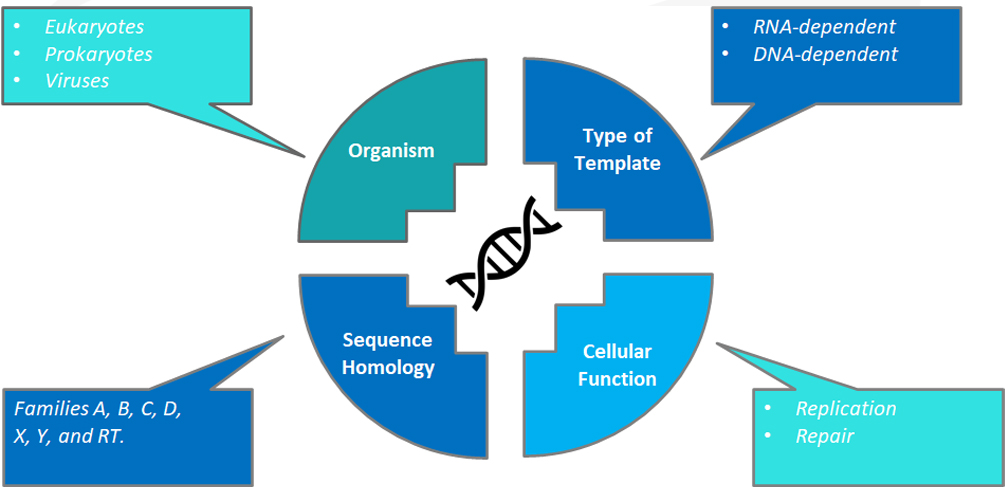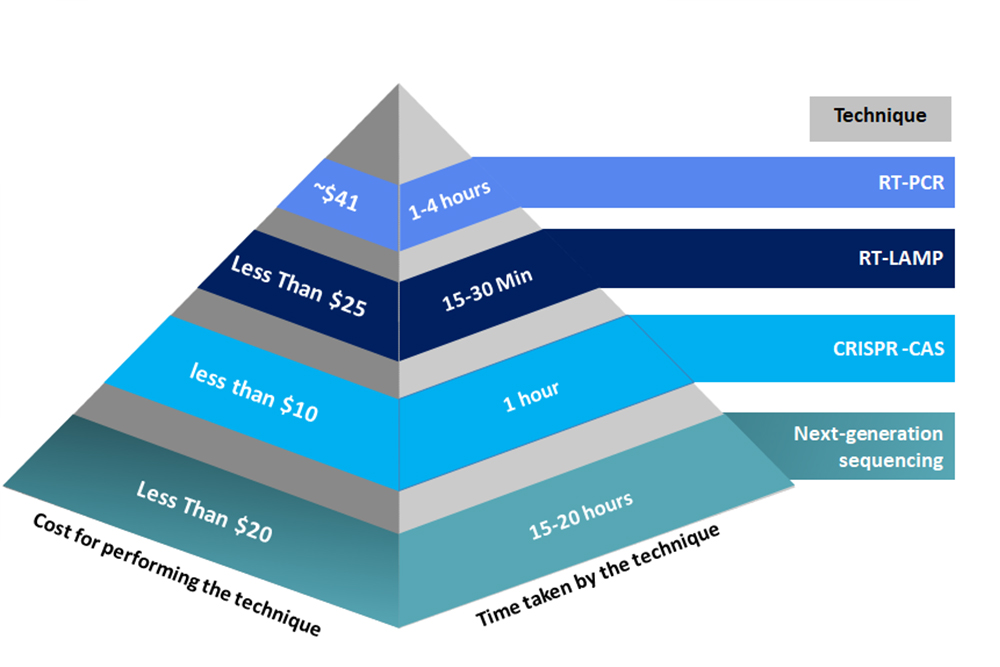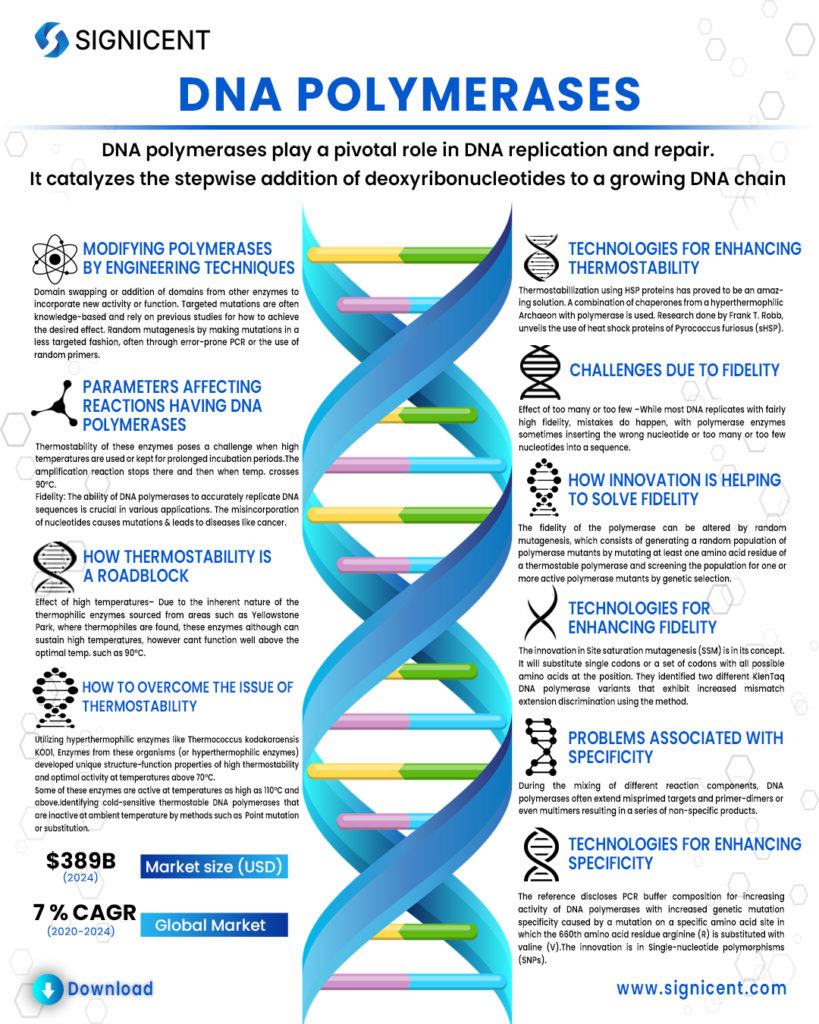This DNA Polymerase Report demonstrates the factors affecting the process and the final product. Fine solutions technological innovations have helped in boosting the market for DNA Polymerase.
DNA polymerases play a pivotal role in DNA replication and repair. It catalyzes the stepwise addition of deoxyribonucleotides to a growing DNA chain. In 1956, Arthur Kornberg and his colleagues discovered Pol I by using Escherichia coli (E. coli) extracts to develop a DNA synthesis assay. DNA polymerase is the primary enzyme that catalyzes the linking of the 3′ hydroxyl group of the end nucleotide to the 5′ phosphate of nucleotide to be added.
The application of DNA polymerases is widely used in the area of research and diagnostics for the amplification of genetic materials. And the process is called PCR ”Polymerase Chain Reaction”. There are certain factors about the polymerases (stability, processivity, and more ) affecting the process and the final product.
There is a huge potential for the growth of the DNA polymerase market with the increasing incidence of cancer, neurological disorders, microbial infections, genetic mutation, chronic diseases.
The DNA Polymerase report will take you through the innovative products, landscape, DNA Polymerase market, emerging & innovative technologies in the area of recombinant DNA technology.

Modifying Polymerases By Engineering Techniques
Domain swapping or addition of domains from other enzymes to incorporate new activity or function. Targeted mutations are often knowledge-based and rely on previous studies for how to achieve the desired effect. Random mutagenesis by making mutations in a less targeted fashion, often through error-prone PCR or the use of random primers. Screening or selection to identify the desired functionality obtained by directed evolution and compartmentalized-self replication (CSR). Fusion of DNA polymerases with proteins, which naturally bind to single- or double-stranded DNA. Chimeric DNA polymerases are proteins whose amino acid sequence consists of sequences from at least two separate proteins.
Parameters Affecting Reactions having DNA Polymerases
Thermostability: Thermostability of these enzymes poses a challenge when high temperatures are used or kept for prolonged incubation periods. The amplification reaction stops there and then when temp. crosses 90°C.
Fidelity: The ability of DNA polymerases to accurately replicate DNA sequences is crucial in various applications. The misincorporation of nucleotides causes mutations & leads to diseases like cancer.
The processivity of an enzyme is defined as the number of nucleotides being processed in a single binding event. DNA polymerase’s processivity often reflects synthesis rate and speed, as well as an affinity for its substrates.
Specificity: Nonspecific amplification is one of the major hurdles in PCR. The yield and sensitivity of target amplification due to synthesis of undesirable products.
How Thermostability Is a Roadblock
Effect of high temperatures– Due to the inherent nature of the thermophilic enzymes sourced from areas such as Yellowstone Park, where thermophiles are found, these enzymes although can sustain high temperatures, however cant function well above the optimal temp. such as 90°C.
Reactivity at ambient temperature – Due to the ambient temperature conditions like 37°C or 42°C these enzymes can lead to the introduction of artifacts during reaction setup.
How to Overcome The Issue of Thermostability
Utilizing hyperthermophilic enzymes like Thermococcus kodakaraensis KOD1, Enzymes from these organisms (or hyperthermophilic enzymes) developed unique structure-function properties of high thermostability and optimal activity at temperatures above 70°C. Some of these enzymes are active at temperatures as high as 110°C and above
Identifying cold-sensitive thermostable DNA polymerases that are inactive at ambient temperature by methods such as Point mutation or substitution.
Technologies for Enhancing Thermostability
Thermostabillization using HSP proteins has proved to be an amazing solution. A combination of chaperones from a hyperthermophilic Archaeon with polymerase is used. Research done by Frank T. Robb, unveils the use of heat shock proteins of Pyrococcus furiosus (sHSP). It helps to confer thermotolerance, effective to combat enzymatic aggregation and intracellular precipitation during heat stress. And thereby enable enhancement of the utility and stability of Taq polymerase in polymerase chain reaction (PCR) applications.
Challenges Due To Fidelity
Effect of too many or too few –While most DNA replicates with fairly high fidelity, mistakes do happen, with polymerase enzymes sometimes inserting the wrong nucleotide or too many or too few nucleotides into a sequence.
MMR defects – Proofreading and mismatch repair (MMR) together maintain high-fidelity DNA replication. However, defect in this property elevates the overall mutation rate and are often associated with increased cancer incidence.
How Innovation is Helping To Solve Fidelity
The fidelity of the polymerase can be altered by random mutagenesis, which consists of generating a random population of polymerase mutants by mutating at least one amino acid residue of a thermostable polymerase and screening the population for one or more active polymerase mutants by genetic selection.
Combining the properties of thermostable exonucleases exhibiting 3′-exonuclease-activity in combination with a thermostable DNA polymerase like Taq lacking proofreading activity can help improve mismatch repair.
Technologies for Enhancing Fidelity
The innovation in Site saturation mutagenesis (SSM) is in its concept. It will substitute single codons or a set of codons with all possible amino acids at the position. They identified two different KlenTaq DNA polymerase variants that exhibit increased mismatch extension discrimination using the method.
By using a combination of exonucleases with polymerases to Show 3′-5′ exonuclease-activity. The use of thermostable exonucleases exhibiting 3′-exonuclease-activity in combination with a thermostable DNA polymerase like Taq lacking proofreading activity especially for nucleic acid amplification by the polymerase chain reaction (PCR).
Each year Signicent provides consultancy to hundreds of organizations to help transform their innovations to value.
How Processivity Is a Problem
The presence of PCR inhibitors such as heparin, xylan, and humic acid, causes the inhibition of the processivity of polymerase. These are found in blood and plant tissues.
High-fidelity DNA polymerases tend to display low processivity due to their strong exonuclease activity. This further slows down the polymerization.
Technological Solutions To Overcome the Problem of Processivity
By fusing enzymes with proteins where attachment of DNA-binding proteins enhances the inhibitor tolerance of chimeric polymerases, processivity can increase up to 3-fold.
DNA polymerases when engineered with a strong DNA-binding domain of another protein show processivity that is enhanced 2- to 5-fold.
Case Studies on Technology for Enhancing Processivity
Fusion between DNA-binding proteins & the enzyme. The reference discloses the method of fusing enzymes with proteins where attachment of DNA-binding proteins enhanced the inhibitor tolerance of chimeric polymerases in loop-mediated isothermal amplification to several of the most common DNA sample contaminants—urea and whole blood, heparin, EDTA, NaCl, ethanol. & the processivity was increased up to 3-fold.
Problems Associated With Specificity
During the mixing of different reaction components, DNA polymerases often extend misprimed targets and primer-dimers or even multimers resulting in a series of non-specific products.
While polymerases typically incorporate natural nucleotides, polymerases have been shown to incorporate non-natural nucleotides, such as modified dNTPs or even ribonucleotides, using DNA templates.
Viable Solutions for Specificity
Prevention of DNA multimerization can be achieved using modified oligonucleotide primers with bulky groups which further interfere with the moving of polymerase along DNA chains.
Increasing activity of DNA polymerases with increased genetic mutation specificity caused by a mutation on a specific amino acid site.
Technologies for Enhancing Specificity
The reference discloses PCR buffer composition for increasing activity of DNA polymerases with increased genetic mutation specificity caused by a mutation on a specific amino acid site in which the 660th amino acid residue arginine (R) is substituted with valine (V). The innovation is in Single-nucleotide polymorphisms (SNPs).
Global Market Trends in DNA Polymerase Market
DNA polymerase Market Size is expected to exceed more than 389 Million by 2024. It is showing a compound annual growth rate (CAGR) of 7%.
The leading players in the area of eukaryotic DNA polymerases include big names like Thermo Fisher Scientific, Merck, Promega, Illumina, F. Hoffmann-la Roche, Takara, and many more.
The global Polymerase Chain Reaction (PCR) Technologies market was valued at $7,027 million in 2016 and is expected to increase by a CAGR of 6.2% from 2017 to 2023 and reach $10,776 million by 2023.
The market of PCR, in Asia-Pacific Regions, is expected to witness a robust CAGR of 9.2% and reach US$2.5 billion by 2022. Along with this, in the North American Region, it is expected to maintain a 2017-2022 CAGR of 7.5% and reach to projected US$5 billion by 2022.
COVID Testing Using Polymerases

Innovative Products in DNA Polymerase Market
Thermofisher Platinum II Taq Hot-Start DNA Polymerase: It shows 4x faster DNA synthesis and inhibitor resistance. It showcases superior specificity, sensitivity, and yields. Also, it allows for a room-temperature reaction setup.
Promega GoTaq® Hot Start Polymerase: Minimizes nonspecific amplification and primer-dimers. It Optimizes reaction conditions with supplied Flexi Reaction Buffer and MgCl2 solution.



